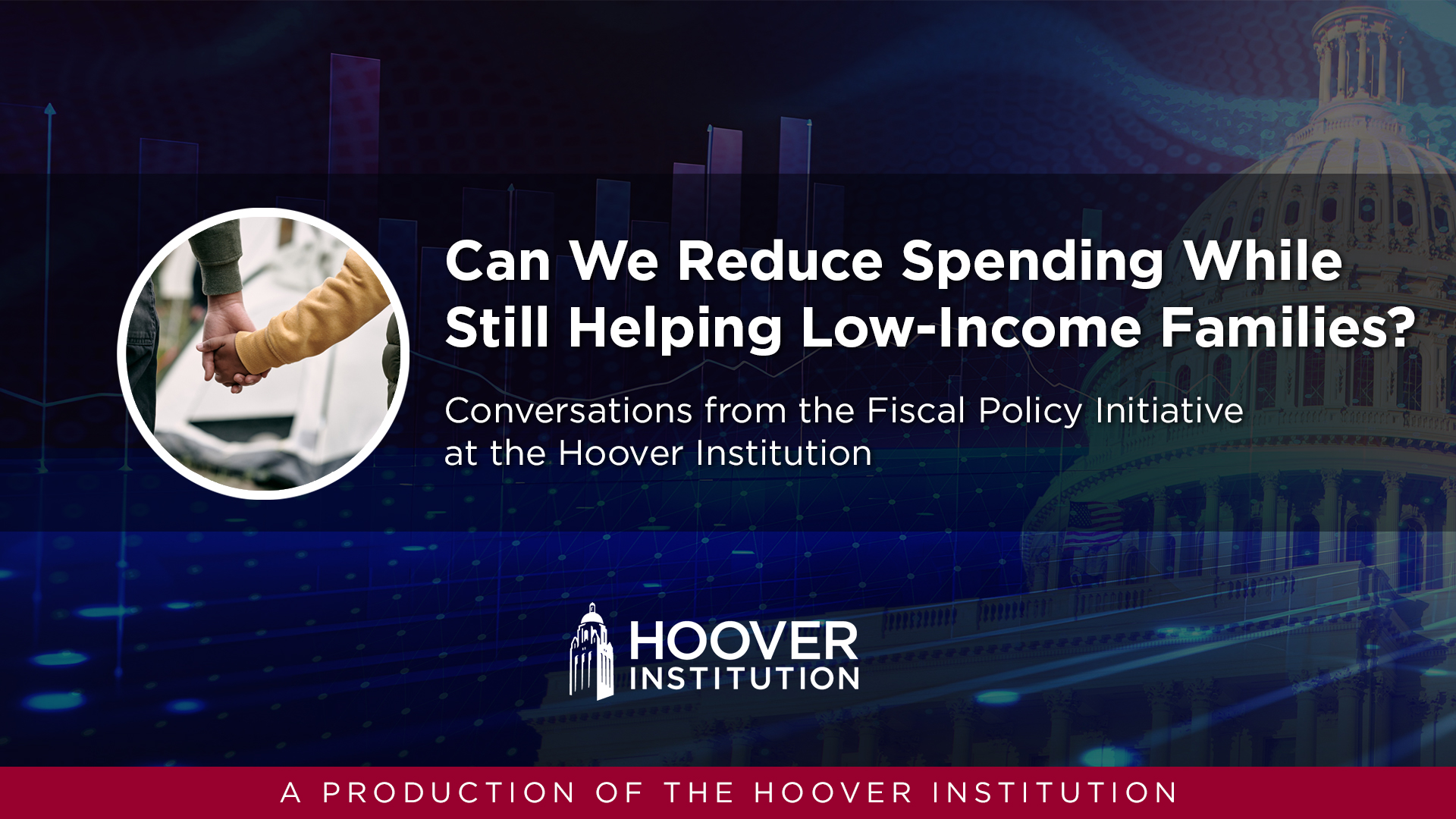- Answering Challenges to Advanced Economies
Well-designed benefit reductions can encourage independence when reforms have the right incentives. The 1996 welfare reform that added time limits and work requirements to cash assistance programs initially faced criticism but ultimately improved outcomes for single-parent families. Effective anti-poverty programs like the Earned Income Tax Credit transfer income to low-income families while simultaneously encouraging work, providing both immediate relief and long-term mobility. Rather than merely lifting people above a poverty line by giving cash, the most successful fiscal approaches promote independence by carefully designing incentives that don’t discourage work.
Learn more about the launch of the Hoover Institution’s Fiscal Policy Initiative.
WATCH THE VIDEO
>> Bruce Meyer: So a great question is whether or not you can cut a government benefit and make people better off at the same time. The best example where I think we did this is welfare reform in the 1990s.
>> Scott Winship: In the 1990s, there was a lot of discussion around welfare reform.
The cash welfare reform program at the time was Aid to Families with Dependent Children. It had a lot of work disincentives and marriage disincentives built into it. A lot of kids were dependent on the program. And there were a lot of proposals that said, hey, this is not good for kids ultimately to be in families that are dependent on getting cash from the government rather than being independent.
And so in 1996, there was a big reform that changed the program. It put time limits on receipt of benefits. It included work requirements for most beneficiaries and at the time I was opposed to it. I thought it was a bad idea. I thought there wasn't gonna be enough work for everybody and that ultimately people would be worse off even if they took work because they would have work expenses, childcare expenses, things like that.
But in time, the research was pretty consistent in showing that single parent families and their kids were actually better off than they were under the old program. And so that has made an impression on me where I now look at programs that don't have work requirements that are strong or time limits, things like our food stamp program, snap, things like housing assistance, even things like Medicaid.
And I no longer assume that if folks couldn't receive those benefits that they would be worse off. I think the example of welfare reform shows that that assumption isn't right.
>> Richard Burkhauser: When you're taking benefits away, it's very harmful if there's no expectations that this is gonna happen. So I think the key reforms have to be ones that give people time to adapt their behavior.
The disincentives in that system were so great that in our attempt to protect children, we were discouraging women from entering the labor market and doing better in terms of their lives and their children's lives.
>> Scott Winship: For a lot of people, I think a lot of progressives, the goal is to just lift somebody above a poverty line at a given point in time.
And so if that's your perspective, the most effective way to do that is to give people cash and you will lift more of them above this line that we have that defines whether you are poor or not. I would say that's a sort of shallow goal for our anti poverty policy.
I think it's more important that what our policies do is provide people the means to become independent on their own, to provide upward mobility, to ensure that their kids have upward mobility. And the way to do that isn't necessarily just to give people cash. You have to think about how these programs are designed to promote independence and to not discourage work, to not discourage marriage.
>> Bruce Meyer: The most effective anti-poverty programs are tax credits to encourage work, principally the earned income tax credit and the current child tax credit. Those programs transfer income to those with low income, while at the same time encouraging work. So they have this doubly good benefit of giving income to those who are at the bottom and really the most needy and encouraging them to be part of society, to spend their time in a productive way and earn the income that supports their families.
>> Scott Winship: So from that perspective, I really like the earned income tax credit, which is technically a tax provision, but it's a benefit that you get even if you don't owe income taxes. And it goes to people who are low income, but they work. And so it has this incentive built into it to encourage people to enter the labor force, to stay in the labor force, to build their skills, to provide a role model for their kids to follow.
So that would be one of my personal favorite anti-poverty proposals.
Featuring:
- Scott Winship, American Enterprise Institute
- Bruce Meyer, University of Chicago
- Richard Burkhauser, Cornell University


















